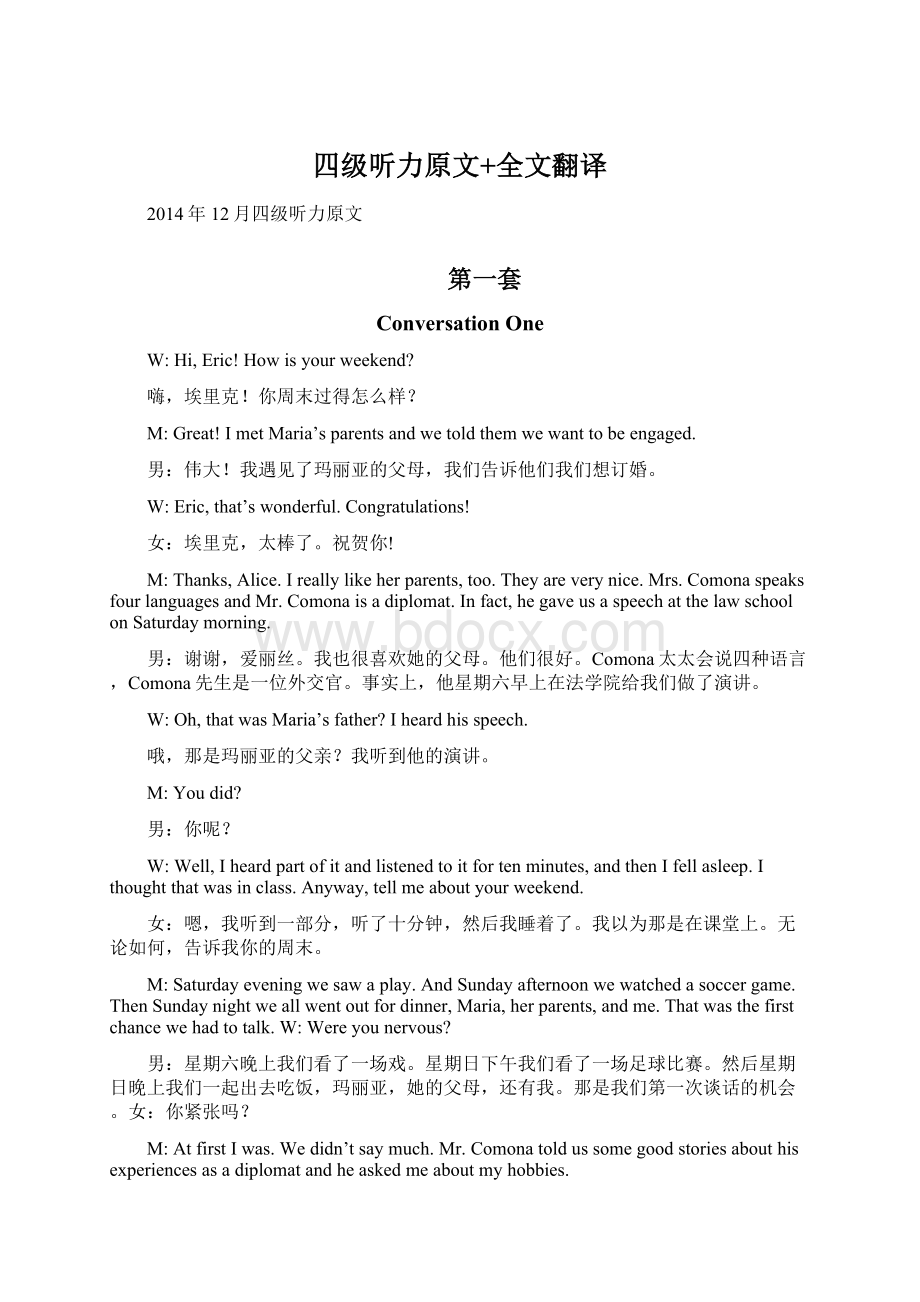四级听力原文+全文翻译Word文档格式.docx
《四级听力原文+全文翻译Word文档格式.docx》由会员分享,可在线阅读,更多相关《四级听力原文+全文翻译Word文档格式.docx(18页珍藏版)》请在冰豆网上搜索。

哦,那是玛丽亚的父亲?
我听到他的演讲。
Youdid?
你呢?
Well,Iheardpartofitandlistenedtoitfortenminutes,andthenIfellasleep.Ithoughtthatwasinclass.Anyway,tellmeaboutyourweekend.
嗯,我听到一部分,听了十分钟,然后我睡着了。
我以为那是在课堂上。
无论如何,告诉我你的周末。
Saturdayeveningwesawaplay.AndSundayafternoonwewatchedasoccergame.ThenSundaynightweallwentoutfordinner,Maria,herparents,andme.Thatwasthefirstchancewehadtotalk.W:
Wereyounervous?
星期六晚上我们看了一场戏。
星期日下午我们看了一场足球比赛。
然后星期日晚上我们一起出去吃饭,玛丽亚,她的父母,还有我。
那是我们第一次谈话的机会。
你紧张吗?
AtfirstIwas.Wedidn’tsaymuch.Mr.Comonatoldussomegoodstoriesabouthisexperiencesasadiplomatandheaskedmeaboutmyhobbies.
起初我是。
我们没有说太多。
Comona先生告诉我们一些关于他的经历的好故事作为一个外交官,他问我关于我的爱好。
Andwhatdidyousay?
你说什么?
Well,Ididn’ttellhimaboutmyflyinglessons.Itoldhimaboutmychessplayingandmyclassicalmusiccollection.
嗯,我没有告诉他我的飞行课。
我告诉他我的下棋和我的古典音乐收藏。
Goodidea!
Herparentsreallyapproveofyou,don’tthey?
好主意!
她的父母真的赞成你,不是吗?
Iguessso.Mariacalledthismorningandsaid,“Myfathertoldmehe’dlikeyouforason-in-lawrightnow.”
我想是这样。
玛丽亚今天早上打电话说:
“我父亲告诉我,他现在想请你当女婿。
”
That’sgreat.
那太好了。
Notexactly.Iwanttogetmarriedaftergraduateschoolinaboutthreeyears.
不完全。
我想在三年后毕业后结婚。
Questions9to11arebasedontheconversationyouhavejustheard.
问题9至11是基于你刚才听到的对话。
9.Q:
WhatdoesEricsayaboutMaria’sfather?
问:
埃里克对玛丽亚的父亲说了些什么?
10.Q:
WhatdidEricandMariadolastSundayafternoon?
埃里克和玛丽亚上星期日下午做了什么?
11.Q:
WhatdowelearnfromMaria’sphonecallthismorning?
我们今天早上从玛丽亚的电话中学到了什么?
重点词汇释义
∙wantto要;
<
口>
应该
∙beengaged有事;
文定;
定婚
∙verynice很好;
非常好
∙Infact事实上;
实际上,其实;
实则;
说起来
∙lawschool法律学院
∙partof部分
∙andthen进而;
于是,然后
∙fellasleep睡着了
∙inclass上课中
∙tellmeabout告诉我关于…
conversationtwo
You’regoingtowearoutthecomputer’skeyboard.
你会穿上电脑的键盘。
Oh,hi!
哦,你好!
Doyouhaveanyideawhattimeitis?
你知道现在几点了吗?
Abouttenortenthirty?
大约十或一零三零?
It’snearlymidnight.
快半夜了。
Really?
Ididn’tknowitwassolate.
真的吗?
我不知道这是如此之晚。
Don’tyouhaveanearlyclasstoteachtomorrowmorning?
你明天早上有没有早起的课要教?
Yes,atseveno’clock,mycommuterclass,thestudentswhogotoworkrightaftertheirlesson.
是的,七点,我的通勤班,他们上课后马上去上班的同学。
Thenyououghttogotobed.Whatareyouwritinganyway?
那么你应该去睡觉。
你在写什么?
AnarticleIhopeIcansell.
我希望我能卖一篇文章。
Oh,anotherofyournewspaperpieces.What’sthisoneabout?
哦,你的另一份报纸。
这个是关于什么的?
DoyourememberthattripItooklastmonth?
你还记得我上个月的那次旅行吗?
TheoneuptotheAmazon?
一个到亚马逊?
Well,that’swhatI’mwritingabout,thenewhighwayandthechangesit’smakingintheAmazonvalley.
嗯,这就是我写的,新的公路和它的变化在亚马逊河流域。
Itshouldbeinteresting.
应该很有趣。
Itis.Iguessthat’swhyIforgotallaboutthetime.
是的。
我想这就是为什么我忘记了所有的时间。
Howmanyarticleshaveyousoldnow?
你现在卖了多少物品?
Aboutadozensofar.
目前大约有12打。
Whatkindofnewspapersbuythem?
什么样的报纸买?
Thepapersthatcarryalotofforeignnews.TheyusuallyappearinthebigSundayeditionswheretheyneedalotofbackgroundstoriestohelpfillupthespacebetweentheads.
这些报纸上有很多外国新闻。
他们通常出现在大星期日版本,他们需要大量的背景故事,以帮助填补广告之间的空间。
Isthereanyfutureinit?
里面有未来吗?
Ihopeso.There’sachanceImaysellthisarticletoanewsservice.
我希望如此。
我有机会把这篇文章卖给新闻界。
Thenyourstorywillbepublishedinseveralpapers,won’tit?
那么你的故事将在几篇论文中发表,不是吗?
That’stheidea.Andtheymightevenbeabletodootherstoriesonaregularbasis.
这就是主意。
他们甚至可以定期做其他的故事。
Thatwouldbegreat.
Questions12to15arebasedontheconversationyouhavejustheard.
问题12至15是基于你刚才听到的对话。
12.Q:
Whatisthewoman’soccupation?
12。
女人的职业是什么?
13.Q:
Whatisthewomanwritingabout?
13。
女人在写什么?
14.Q:
Wheredidthewoman’sarticlesusuallyappear?
14。
女人的文章通常出现在哪里?
15.Q:
Whatdoesthewomanexpect?
15。
女人期待什么?
PassageOne
Bodylanguage,especiallygestures,variesamongcultures.Forexample,anodoftheheadmeans“yes”tomostofus.ButinBulgariaandGreeceanodmeans“no”andashakeoftheheadmeans“yes”.Likewise,asignfor“OK”,formingacirclewithourforefingerandthumb,meanszeroinFranceandmoneyinJapan.
肢体语言,尤其是手势,在不同的文化中。
例如,点头表示“是”,我们大多数人。
但在保加利亚和希腊,点头表示“不”,摇头表示“是”。
同样,一个“OK”的标志,用食指和拇指组成一个圆圈,意味着法国的零和金钱在美国的。
WavingorpointingtoanArabbusinesspersonwouldbeconsideredrudebecausethatishowArabscalltheirdogsover.FoldedarmssignalprideinFinland,butdisrespectinFiji.ThenumberofbowsthattheJapaneseexchangeongreetingeachother,aswellasthelengthandthedepthofthebows,signalsthesocialstatuseachpartyfeelstowardstheother.
挥舞或指着阿拉伯商人将被认为是粗鲁的,因为这就是阿拉伯人叫他们的狗。
芬兰的双臂信号骄傲,但不尊重在斐济。
日本人互相问候的弓箭数量,以及弓箭的长度和深度,都反映了对方对对方的社会地位。
Italiansmightthinkyou’reboredunlessyouusealotofgesturesduringdiscussions.ManyAmericanmensitwiththeirlegscrossedwithoneanklerestingovertheoppositeknee.However,thiswouldbeconsideredaninsultinMuslimcountries,whereonewouldnevershowthesoleofthefoottoaguest.
意大利人可能认为你无聊,除非你在讨论中使用很多手势。
许多美国男子盘腿而坐,一只脚踝放在对面的膝盖上。
然而,这将被认为是侮辱穆斯林国家,其中一个永远不会显示脚底的客人。
Likewise,Americansconsidereyecontactveryimportant,oftennottrustingsomeonewhoisafraidtolookyouintheeye.ButinJapanandmanyLatinAmericancountries,keepingtheeyesloweredisasignofrespect.Tolookapartnerfullintheeyeisconsideredasignofill-breedingandisfelttobeannoying.
同样,美国人认为目光接触非常重要,常常不信任那些不敢直视你眼睛的人。
但是在日本和许多拉丁美洲国家,保持低视力是尊敬的标志。
看着一个伴侣的眼睛被认为是一个迹象,滋生不良,感到讨厌。
Questions16to18arebasedonthepassageyouhavejustheard.
问题16至18是基于你刚才听到的通道。
16.Q:
WhatgesturedoBulgariansandGreeksusetoexpressnegativeresponses?
16。
什么是保加利亚人和希腊人使用手势来表达负面的反应?
17.Q:
WhatislikelytooffendArabbusinesspeople?
17。
有什么可能得罪阿拉伯商界人士?
18.Q:
WhatisconsideredtobeimpoliteinMuslimcountries?
18。
在穆斯林国家,什么是不礼貌的?
∙Bodylanguage身体语言,手势语言,肢体语言
∙Forexample例如,譬如;
拿...来说
∙signfor签收
∙acircle一周;
一圈
∙businessperson商人
∙becausethat因为,由于
∙Thenumber数字23
∙eachother互相,彼此
∙aswellas也,又;
既…又…;
除…之外;
此外
∙socialstatus社会地位;
身价
PassageTwo
Threeyearago,PantchaMaya,herhusbandandfivechildrenlivedinashakyflatinsouthernNepal.Everymorningtheparentswalkedthedirtroadsseekingworkinthericefields.Aftertheharvest,thefamilywentbeggingforfood.
三年前,PantchaMaya,她的丈夫和五个孩子居住在尼泊尔南部的一个不稳定的平。
每天早晨,父母走过土路在稻田里找工作。
收获后,一家人去乞讨食物。
TodaytheMayasownasmallpaper-bag-makingcompany.Withthemoneythey’veearned,theMayashavepurchasedasmallplotonwhichtheygrowvegetablesandraisegoatsforadditionalincome.Infact,thefamilyhassaved68dollars.Thisisremarkableinacountrywithanaverageannualincomeof160dollars.GraceMumbkaherhusbandandeightchildrenoncelivedhand-to-mouthinCameroon.
今天,Mayas自己的一个小纸袋制造公司。
用这些钱他们赚了,Mayas买了一小块,他们种植蔬菜和增加额外收入的山羊。
事实上,家庭节省了68美元。
在一个平均年收入160美元的国家里,这是非常值得注意的。
GraceMumbka的丈夫和八个孩子曾经糊口在喀麦隆。
TodaytheMumbkasrunaclothing-manufacturingbusinessandownahome.Theyareabletosendtheirchildrentoschoolatacostlyannualsumof2,800dollars.TheideaofstartingherownbusinessseemedimpossibletoPillarMulyaa,apoorwomanfromAtahualpa,highinEcuador’sAndesMountains.
今天的mumbkas经营服装制造企业,拥有一个家。
他们能以每年2800美元的代价把孩子送到学校。
她创业的想法似乎不可能的支柱mulyaa,来自Atahualpa一个可怜的女人,在厄瓜多尔的安第斯山脉。
Today,however,she’soneoftheproudownersofabakeryspecializinginsweetcakes.Thesebusinessesarepartofaneconomicrevolutionsweepingthedevelopingworld.ThesponsoristheTrickleUpProgram,anon-profitorganizationfoundedbyNewYorkersGlenandMildredLeet.ThisorganizationofferspeopleliketheMayas,theMubkasandtheMoyasmodest100-dollargrants.Since1979,theprogramhashelpedover130,000oftheworld’sneediestpeoplein90countrieswinsmalllife-savingvictoriesoverpoverty.Andithasturnedconventionalthinkingaboutforeignaidonitshead.
然而,今天,她是一家专门从事甜点的面包店的骄傲的老板之一。
这些企业是席卷发展中国家的经济革命的一部分。
发起人是涓流程序,由纽约格伦和mildredleet成立一个非营利组织。
这个组织提供的人喜欢Mayas的mubkas和moyas温和的100美元赠款。
自1979以来,该计划已帮助超过130000的世界上最贫穷的人在90个国家赢得小救生战胜贫困。
它已经改变了传统的对外援助思想。
Questions19to21arebasedonthepassageyouhavejustheard.
问题19至21是基于你刚才听到的通道。
19.Q:
WhatdowelearnaboutPantchaMaya’sfamilyoverthreeyearsago?
20.Q:
WhatistheMumbkasabletodonow?
19。
什么是我们了解PantchaMaya的家人在三年前吗?
20。
什么是mumbkas能做吗?
21.Q:
Whatdoesthespeakermainlytalkabout?
21。
演讲者主要谈论什么?
∙shaky动摇的;
摇晃的;
虚弱的;
不可靠的
∙Everymorning每天早晨
∙workin插进;
引进;
掺和
∙Mayas玛雅人,玛雅语(Maya的名词复数);
喻>
幻境,使生幻觉的法力(maya的名词复数)
∙growvegetables种菜
∙additionalincome额外收入
∙annualincome全年所得额;
岁入
∙hand-to-mouth无隔宿之粮的,仅能糊口的
∙ableto能;
会
PassageThree
Takecareofyourteethandyourteethwilltakecareofyou.Yourteetharealivingpartofyourbody.Theyhavenervesandbloodvessels.Diseasedteethcancausepain,dieandfallout.Plaqueisthemainenemyofhealthyteeth.Everyonehasplaque.Itisasticky,colorlessfilmthatcoatstheteeth.Plaqueisalwaysformingontheteeth,especiallyatthegumline.Ifplaqueisnotremoved,itbuildsupandgetsunderthegumline.Plaquethatislefton